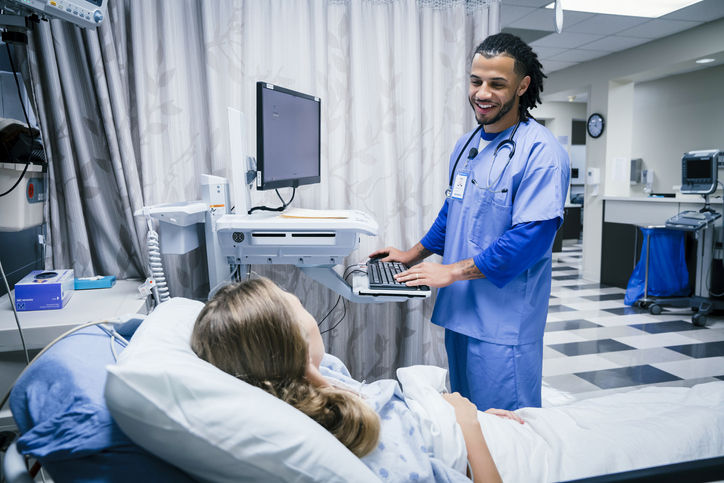Surgical Serenity headphones are designed to make pain and anxiety medications less necessary and to give a person going into surgery more control over the experience. Dr. Alice Cash programs the headphones with music designed to help a person relax. The patient listens to the music at home before the surgery, during the surgery and continues wearing the headphones into the recovery area.
“The music the patient needs — slow, steady comforting — is the opposite of what the doc needs. Plus the patient doesn’t need to hear the doctor’s music or the conversation going on around them,” she said. “There is also a large placebo effect – knowing you have a safe cocoon can lower anxiety and lower blood pressure.”
“The goal is less anxiety meds before the surgery, less anesthesia during, and fewer pain meds after.”

With the Rise of AI, What IP Disputes in Healthcare Are Likely to Emerge?
Munck Wilson Mandala Partner Greg Howison shared his perspective on some of the legal ramifications around AI, IP, connected devices and the data they generate, in response to emailed questions.
“Hospitals benefit too because they could process more people through surgery because patients would get out of the recovery area sooner.”
Who?
Dr. Alice Cash, a clinical musicologist and professional musician with a masters in social work. She also has a bachelors and masters in piano performance and a doctorate in musicology. Cash has studied the effect of music on people with Alzheimer’s and Parkinson’s, on bonding between parents and children, and on people suffering from anxiety.
“In the late 90s, I spoke to Jefferson County Retired Doctors and Dr. Kenton Leatherman was there. He said he had been using using music for patients since the 50s. He had a lady whose sole job was to sit in the corner of the OR and change records.”
What is it?
Bluetooth headphones pre-programmed with music designed to slow the heartbeat and encourage relaxation before, during and after surgery. Cash deletes the music that comes with the headphones and transfers her music onto each set. She charges $147.97 for a set of headphones and offers the playlist as a download. She has a patent on process of compiling music for surgery.
What kind of music?
“Right now I have a concert pianist friend and he had made a CD of classical piano miniatures, 2 – 3 minute, slow, pleasing piano pieces. It’s important not to include anything familiar so as to avoid bad associations. It’s Mendelssohn, Schubert, Handel and Mozart on the acoustic grand piano.”
Clinical proof?
“There is a study at Louisville’s Veterans hospital, but it is going slow because they are using the headphones for abdominal surgery on people between 18 – 25, and that excludes most people.”
Success so far?
About 150 Web sales; discussions with the head of music therapy at Cleveland Clinic, a second major hospital, and a chain of national treatment centers.
“I am also talking with a medical treatment company about creating their own soundtrack.”
Market size?
About 20 million Americans have surgery with general anesthesia every year. Some studies suggest that the long-term effects of anesthesia can include premature death. Addition to prescription painkillers is a growing problem.
Competitors?
“There’s nothing like it out there; I searched and patent attorney searched.”
What’s next?
“Between having credentials that very few people in the world have and being the first in the market, we can be the Apple of the surgery headphone world and people will line up behind us.
“I’d like to see someone with a major business head or someone with a head for medical devices run the business and let me be the musical consultant.”
Read more: Blog Twitter Surgical Headphones web site, Surgical Serenity web site (scroll down several pages to hear a sample of the music)














